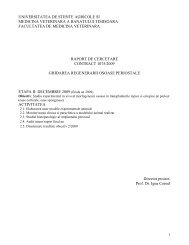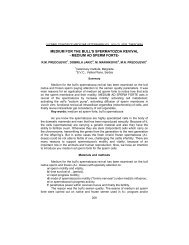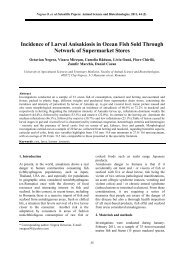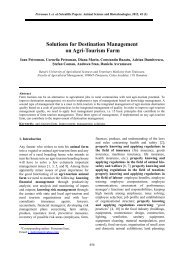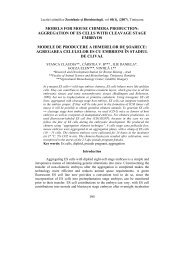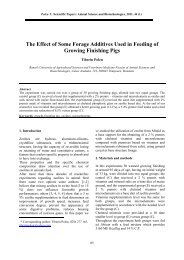journal of linguistic studies
journal of linguistic studies
journal of linguistic studies
Create successful ePaper yourself
Turn your PDF publications into a flip-book with our unique Google optimized e-Paper software.
ather referred to as our eastern neighbours, and instead <strong>of</strong> speaking about these countries<br />
individually and using their individual names, they are generally described as our<br />
immediate common neighborhood. 7 This can be illustrated by the following examples<br />
…Croatia, more and more strongly incorporated in the European Union and the<br />
NATO, will continue her responsible mission in the south-east <strong>of</strong> Europe. (from<br />
the speech <strong>of</strong> the Prime Minister <strong>of</strong> the Republic <strong>of</strong> Croatia in the occasion <strong>of</strong> the<br />
visit <strong>of</strong> the President <strong>of</strong> the United States <strong>of</strong> America, Mr. George W. Bush)<br />
(http://www.vlada.hr/hrvatski/premijer/aktualnosti/govori/2008/govor_predsjedni<br />
ka_vlade_rh_u_prigodi_posjeta_predsjednika_sad_a_georgea_w_busha)<br />
…We, however, do not observe our European way as separated from the region <strong>of</strong><br />
which we are a part. We hold that the whole region, i.e. each country in the<br />
region individually, must have a European perspective. (From the speech <strong>of</strong> the<br />
then President <strong>of</strong> the Republic <strong>of</strong> Croatia in Hungarian Parliament at the<br />
conference “Together in Diversity”, Budapest 9 th May 2008)<br />
(http://www.predsjednik.hr/Default.aspx?art=15072)<br />
…Rule <strong>of</strong> law, respect for human rights and rights <strong>of</strong> minorities, the power <strong>of</strong><br />
argument, instead <strong>of</strong> the argument <strong>of</strong> power, these are elements <strong>of</strong> democratic<br />
heritage to which our immediate common neighbourhood still needs get<br />
accustomed to. (From the speech <strong>of</strong> the then President <strong>of</strong> the Republic <strong>of</strong> Croatia<br />
in Hungarian Parliament at the conference “Together in Diversity”, Budapest 9 th<br />
May 2008) (http://www.predsjednik.hr/Default.aspx?art=15072)<br />
In the sphere <strong>of</strong> economy and economic policy, the purpose <strong>of</strong> public announcements<br />
<strong>of</strong>ten extends beyond the simple need to inform the public about the current economic<br />
situation and serves a different purpose: to emphasize certain achievements. Even if these<br />
accomplishments are in reality much less spectacular or important as presented (or maybe<br />
precisely because they are much lesser than expected), they still need to be shown in the<br />
best light. To this end, actual, concrete data and indicators are replaced with or wrapped<br />
up in expressions that will achieve the desired effect and decorate the achievement with<br />
necessary superlatives. Moreover, a frequent procedure is that which is used, for example,<br />
by doctors when they must inform their patients about unpleasant news, in such cases<br />
euphemization includes highly technical terms known to the “insiders” but not necessarily<br />
to the majority <strong>of</strong> the population. Thus, the public is impressed by the expression itself,<br />
without really understanding what is really hiding behind it. Depending on the topic and<br />
field in which they are used, euphemisms can include various acronyms or abbreviations,<br />
numerical expressions, and even words that are used by particular social groups or words<br />
belonging to slang. Some <strong>of</strong> these cases are shown in the following examples:<br />
…unemployment has been reduced to the historically lowest level. (There are, <strong>of</strong><br />
course, no actual figures or percentages)<br />
…We shall intervene against the floating exchange rate and depreciation <strong>of</strong> the<br />
Kuna.<br />
…We must continue with our consistent economic policy and avoid short-term<br />
interventionist moves.<br />
61



